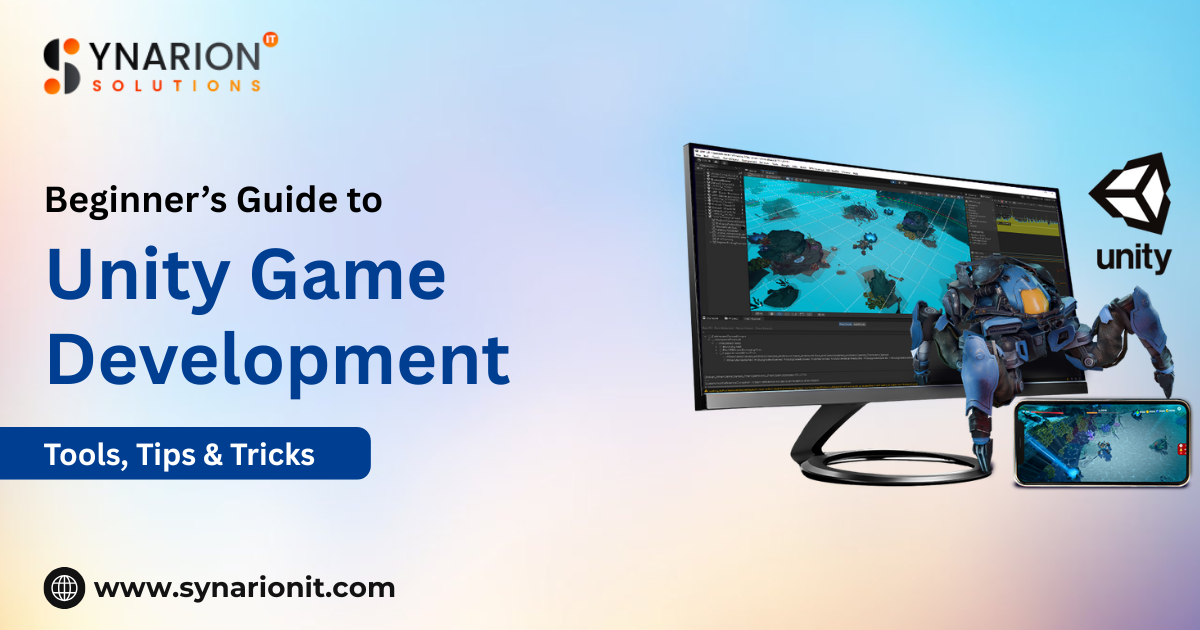If you’re new to the world of game creation, Unity Game Development is one of the best starting points to bring your ideas to life. Whether you want to create a simple 2D platformer or an immersive 3D adventure, Unity provides a versatile and powerful platform suitable for beginners and professionals alike. In this guide, we’ll explore the essential tools, tips, and tricks you need to know to start your journey in Unity Game Development. We’ll also touch on what to expect if you decide to work with a professional Unity Game Development Company.
What is Unity Game Development?
Unity is a cross-platform game engine developed by Unity Technologies. It is widely popular because of its user-friendly interface, robust features, and strong community support. Unity allows developers to build games for PC, consoles, mobile devices, VR/AR, and even web browsers.
With Unity, game developers use C# programming language, visual editors, and a vast ecosystem of plugins and assets to build their projects. The engine supports both 2D and 3D game development, making it incredibly versatile.
Getting Started: Essential Tools in Unity Game Development
Unity Editor
The Unity Editor is the primary workspace where you design, build, and test your game. It includes several windows such as:
- Scene View: Where you place and manipulate game objects.
- Game View: Allows you to preview the game from the player’s perspective.
- Hierarchy: Shows all the game objects in the current scene.
- Inspector: Displays details and properties of selected objects.
- Project Window: Manages all your assets like scripts, textures, and sounds.
Visual Studio or Visual Studio Code
For scripting, you’ll need a code editor. Unity integrates seamlessly with Visual Studio and Visual Studio Code, both of which provide debugging tools, IntelliSense (code completion), and syntax highlighting to make writing C# scripts easier.
Asset Store
Unity’s Asset Store is a treasure trove of free and paid assets, including 3D models, animations, sound effects, and pre-made scripts. This is invaluable for beginners who want to save time and focus on learning core concepts without building everything from scratch.
Tips and Tricks for Beginners
Start Small
One of the biggest mistakes beginners make is trying to build complex games right away. Start with small projects like a simple Pong or a basic platformer. This helps you understand the workflow and build confidence.
Learn C# Basics
Unity scripts are written in C#, so learning the basics of this programming language is crucial. Focus on variables, functions, loops, and object-oriented programming principles. Plenty of free tutorials and courses are available online specifically for Unity scripting.
Utilize Tutorials and Documentation
Unity has extensive official documentation and beginner-friendly tutorials. Follow these step-by-step guides to understand the engine’s core features. Community forums and YouTube channels are also great resources.
Make Use of Prefabs
Prefabs are reusable game objects. Once you create a prefab, you can place multiple instances of it across different scenes. This saves time and ensures consistency.
Use Physics and Colliders Wisely
Unity has a built-in physics engine that allows objects to behave realistically. Learn how to use Rigidbody components and colliders to handle movement, gravity, and interactions between game objects.
Debugging is Key
Don’t get discouraged if your game doesn’t work as expected. Use Unity’s console to check errors and add Debug.Log() statements in your scripts to track down issues.
Common Challenges and How to Overcome Them
Performance Optimization
Beginners often face slow game performance due to unoptimized code or high-resolution assets. Learn to profile your game and optimize scripts and assets to ensure smooth gameplay.
Understanding Scene Management
Managing multiple levels or scenes can be confusing. Unity provides SceneManager to load and unload scenes dynamically, which you should get comfortable with.
Animation Setup
Creating smooth animations requires practice. Use the Animator window and animation clips effectively to breathe life into characters and objects.
When to Consider Hiring a Unity Game Development Company
While learning Unity on your own is rewarding, there comes a point where the scope of your project might exceed your current skillset or timeline. This is when working with a Unity Game Development Company can be highly beneficial.
Why Hire a Unity Game Development Company?
- Expertise and Experience: Professional companies bring years of experience, ensuring your game is developed efficiently and with high quality.
- Access to Advanced Tools: They often have proprietary tools and workflows to speed up development.
- Multidisciplinary Teams: A full team of designers, programmers, artists, and testers work together to deliver polished products.
- Post-Launch Support: Companies provide maintenance, updates, and troubleshooting after your game goes live.
If you have a business idea or a complex game concept but lack technical skills, outsourcing to a Unity Game Development Company can be a smart move. It can save you time, reduce risks, and improve the overall quality of your game.
Final Thoughts
Unity Game Development is an exciting and accessible entry point for aspiring game developers. By mastering the essential tools like the Unity Editor and C# scripting, following practical tips, and learning from available resources, you can create compelling games even as a beginner.
If your ambitions grow or you want to accelerate your project, partnering with a Unity Game Development Company can open doors to professional expertise and higher production values.
So, whether you choose to go solo or collaborate with experts, the world of Unity Game Development offers limitless opportunities to turn your creative visions into reality.




